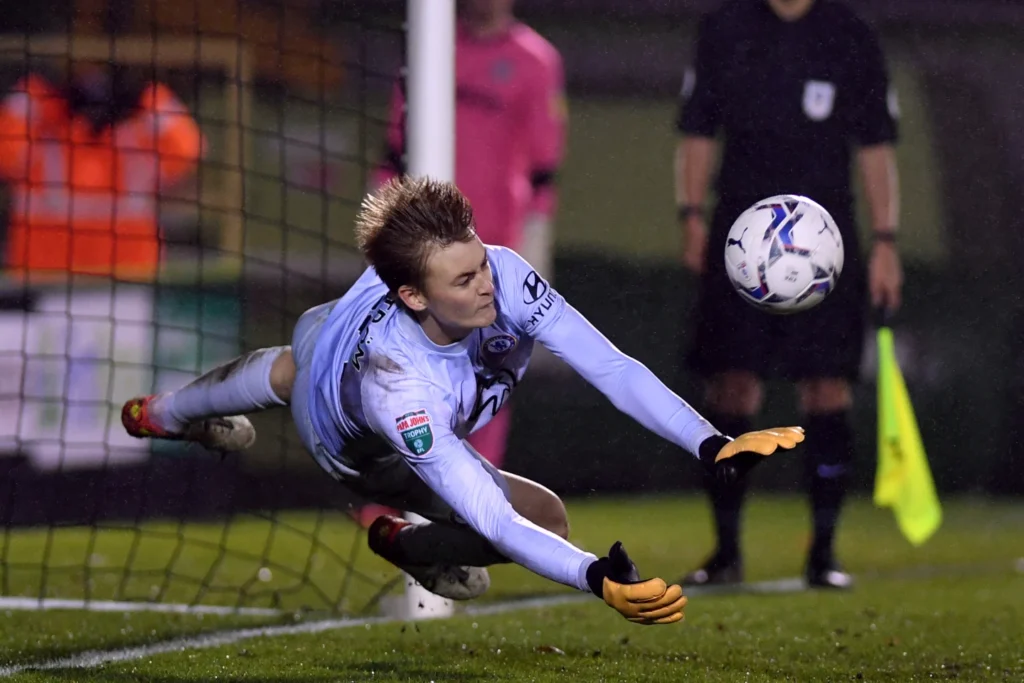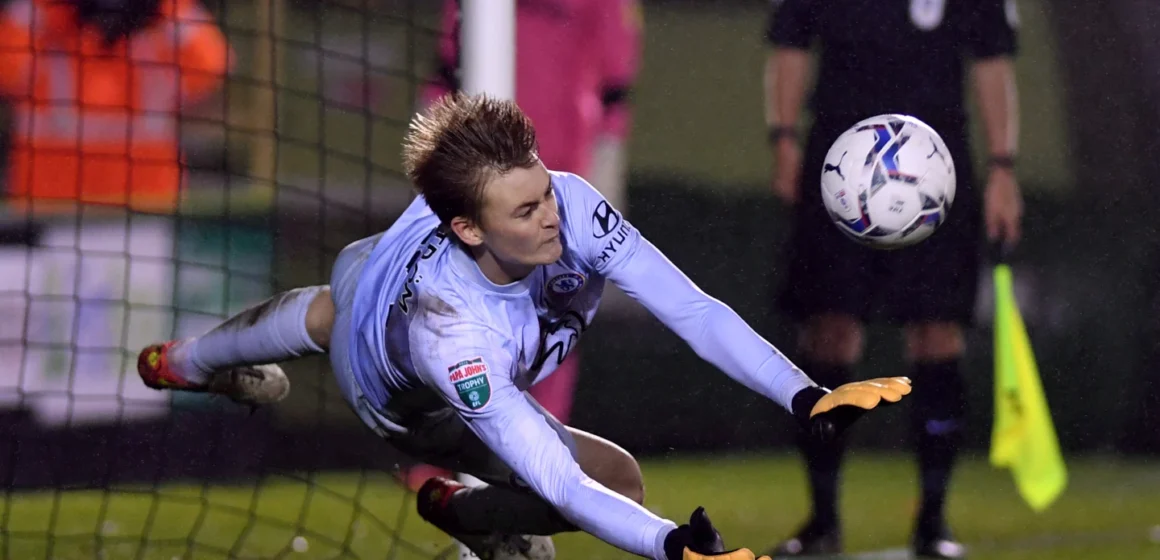
In today’s hyper-competitive world, the football field can feel more like a battleground than a playground. On 10 June 2025, Chelsea FC announced they would release three promising youth goalkeepers—Lucas Bergström, Eddie Beach, and Luke Campbell—as their contracts end this month. For many, it’s a harsh reality check: as much as academy football promises dreams, it delivers heartbreak too.
The Breakdown: Who’s Leaving and Why It Matters
- Lucas Bergström (22)
A Finnish-born talent with proximity to Chelsea’s first-team benches and a solid loan stint at Peterborough United. Yet, not enough to earn a spot beyond contract expiry. - Eddie Beach
A fascinating case—transitioning from outfielder in Sunday leagues to goalkeeper through Southampton, then to Chelsea in 2022. Loan spells at Crawley Town didn’t provide the breakthrough he needed. - Luke Campbell (19)
A lifelong Blues academy product since U9, seasoned via senior loan at non-league Hendon FC. His emotional Instagram farewell—“After ten incredible years, it is time for us to part ways”—echoes a universal feeling for many academy players.
These departures arrive amid a broader exodus: Chelsea also looks set to lose veteran backup Marcus Bettinelli, next on his way to Manchester City weaintgotnohistory.sbnation.com. What at first glance seems normal in football development is actually part of something more systemic—an industry where youth is both currency and collateral.
The Domino Effect on Young People
- Dreams vs. Reality
For every academy hopeful, there are countless hours of training, sacrifices, and belief. Yet, closing that final door feels like a personal failure, even when it isn’t. - Mental Health Strain
Studies show that rejection—especially in close-knit industries like sports—can bring anxiety, loss of identity, and depression. When your life revolves around being a ‘Chelsea player’, what happens when that title disappears? - Identity Crisis
These young men aren’t just goalkeepers—they’re friends, students, artists, tech geeks. But when the club drops you, suddenly your identity gets tied to a ‘yes’ or ‘no’. - Rerouting Pathways
The good news? These players aren’t doomed. An academy pedigree like Chelsea tends to open doors: loans, trials, contracts elsewhere. But the transition demands resilience, adaptability, and a willingness to reinvent.
Why Clubs Shift Focus: The Cold Hard Logic
Chelsea’s academy, like those at many elite clubs, is a revolving door. Their investment strategy? Recruit top talents globally, develop them to a level where they can either serve the first team or fetch a transfer fee. If they don’t pass the threshold, the club moves on.
That’s not sinister—it’s a business model. But for young players and their families, it’s personal. Reddit fans have long debated Chelsea’s handling of youth players, citing stars like Kevin de Bruyne, Mo Salah, and Declan Rice who succeeded only after leaving the Blues. The narrative is clear: elite academies invest in possibilities, not futures. For every academy standout, there are dozens of under-the-radar talents who fall through the cracks.
Turning Pain into Purpose
Despite the pain, there’s opportunity in misstep—even from Stamford Bridge’s harshest shadows.
- Resilience Builds Character
Learning you’re replaceable is painful—but it teaches grit, the ability to bounce back, and to fight harder. - New Beginnings, New Brands
Many released players rapidly find success at smaller clubs. There, they gain real game time, leadership roles, and sometimes bloom into stronger versions of themselves. - Careers Beyond the Pitch
Chelsea’s academy doesn’t just teach football—it teaches professionalism, media savviness, community work, and character-building. These are skills that translate seamlessly into coaching, media, education, or entrepreneurship. - Mental Health as a Superpower
Navigating rejection helps these players develop emotional literacy. Over time, they become pillars of support—leaders who guide other young people through similar challenges.
What This Means for Young People Everywhere
- The Club Doesn’t Define You
Whether you’re a goalkeeper, trainee chef, or content creator—one setback doesn’t seal your fate. The journey isn’t always straight. - Rejection ≠ Redeployment
Academies and internships aren’t meant to be permanent. They’re springboards. Use them to catapult, not to fixate. - Find New Training Grounds
Just like Bergström might thrive elsewhere, you can find places—smaller companies, emerging brands, community projects—where you’ll matter. - Invest in Yourself
Chelsea invests £millions in training—what can you do to invest in self-development? Side-hustles, courses, community events—these can build the resilience employers seek. - Mentorship Creates Visibility
Many academy rejects later coach or mentor younger players. Carry forward the lessons and be part of building a stronger future network.
Final Whistle: Changing the Game Plan
Chelsea’s decision to release youth goalkeepers is more than football news—it’s a mirror reflecting real-world truths. Life is fiercely competitive, and even if you’re good, you might still get the nod to exit. But what matters is what you build next.
Bergström, Beach, and Campbell all carry Chelsea’s badge with them—and that counts. Their journey continues in League One boots, non-league cleats, or on pitches halfway across the world. Their stories aren’t endings—they’re next chapters.
https://insidesuccessmagazine.com/category/career
Zita Salum, a British, Tanzanian journalist with a London heart, is making waves in the world of media. Born and Raised in Hackney London, she discovered her passion for storytelling at a young age. Her journey began as an admin for the Inside Success magazine, but her talent quickly shone through. Zita's ability to craft compelling narratives and her knack for capturing the essence of a story led her to become an editor for the magazine.
From there, her career soared. Zita has contributed to a diverse range of publications, including the prestigious W magazine, showcasing her versatility as a writer. Her expertise spans across industries such as music, corporate, political, sports, arts, and fashion. Beyond her written work, Zita has also excelled in broadcast journalism. Her natural ability to connect with interviewees and her engaging hosting style have made her a sought-after talent in the industry.
In her free time, Zita is a dedicated networker, attending industry events and immersing herself in the latest trends. She is also passionate about investigative journalism and has produced creative documentaries that shed light on important issues. With her talent, drive, and unwavering commitment to her craft, Zita Salum is undoubtedly a rising star in the world of journalism.




Leave a Reply
You must be logged in to post a comment.